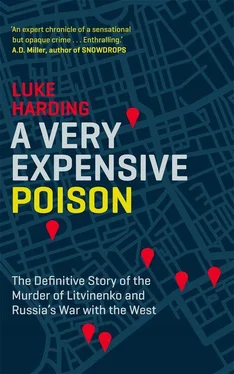Both litigants had submitted witness statements to the judge, Mrs Justice Gloster. They made fascinating reading. Berezvosky’s gave an account of his relations with Putin, a tale of friendship and – as both men saw it – betrayal. The two were once close. They first met in late 1991 when Putin was head of St Petersburg’s external-relations committee and Berezovsky was trying to expand his LogoVAZ car franchise. ‘During this time we became friends,’ Berezovsky wrote. They went on holiday together in Russia and abroad, he said. In the early 1990s, Putin stayed with Berezovsky at his chalet in Gstaad in Switzerland for several days.
In his statement, Berezovsky took credit for Putin’s rapid rise in politics. He said that he introduced Putin to Yeltsin’s team, and supported his appointment as FSB chief. When Litvinenko revealed the plot to kill Berezovsky, the oligarch was ‘disappointed’ by Putin’s cool reaction. Nevertheless, they remained friends. In February 1999, Putin turned up to the birthday party of Berezovsky’s partner Elena Gorbunova. Later the same year, Berezovsky backed Putin as prime minister. He even flew to Biarritz that summer to persuade him to take the job – shades here of a reluctant Julius Caesar refusing to take the crown.
Like many others, Berezovsky appears to have found in the inscrutable Putin what he wanted to see. There were warning signs but he chose to ignore them. During one meeting, he spotted that Putin had a statue of Felix Dzerzhinsky, the head of the Cheka, Lenin’s murderous secret police, in his office. Berezovsky was astonished but said: ‘He [Putin] had never before seemed to be a chekist – someone who believed that the security organisations were entitled to do as they pleased.’
Once Putin was in the Kremlin, these tensions escalated into full-blown conflict. ‘I am not the kind of person who can remain silent when someone, even the president, is acting politically in a way with which I disagree,’ he told the court, truthfully.
The end came when Berezovsky’s ORT TV station criticised Putin for his apparent indifference over the sinking of the Russian submarine Kursk . The navy vessel suffered an explosion in the Barents Sea; everybody on board drowned. Putin, meanwhile, was on holiday near the resort of Sochi, riding around on a jet ski. Berezovsky said he rang Putin and told him he had to get back to Moscow, otherwise the criticism would get worse. Putin was furious.
During their last meeting in August 2000, Putin told Berezovsky to sell ORT or go to jail. The president accused Berezovsky of ‘hiring prostitutes to pose as the widows and sisters of sailors killed aboard the Kursk to attack him verbally’. The allegation was crazy, probably invented by the FSB, and Berezovsky said so. Putin’s parting words were stiff: ‘Goodbye, Boris Abramovich,’ he said, using the formal patronymic. Berezovsky’s sorrowful reply, addressing Putin’s informally, was: ‘Goodbye, Volodya.’
In October 2000, and under criminal investigation, the oligarch left for France and then Britain, never to go back.
Berezovsky’s fall coincided with Roman Abramovich’s rise. By the late 1990s, Abramovich was a Kremlin insider in his own right. (In 1999, he allegedly approached Berezovsky and suggested they buy Putin a $50 million yacht as a present. Berezovsky declined; Abramovich bought the yacht anyway.) By 2000 – according to Berezovsky – Abramovich ‘played a central role in the selection of members of President Putin’s cabinet’, and had the power to open and shut criminal cases.
Abramovich took advantage of his position, Berezovsky said. In exile he was compelled to sell his interest in Sibneft at a ‘gross undervalue’. His stake was worth at least $7 billion, Berezovsky claimed. Abramovich paid him a measly $1.5 billion. Berezovsky didn’t think much of Abramovich’s intellectual gifts either. But, he said, his former friend had one magical talent: everyone liked him. Berezovsky wrote: ‘He is good at psychology in this way. He is good at appearing to be humble. He is happy to spend days socialising with important or powerful people if that is what is needed so that he can get closer to them.’
By the time of Litvinenko’s poisoning, Abramovich was a Kremlin insider and loyal functionary, serving as governor of Chukotka, a barren and backward federal district on Russia’s remote north east Pacific coast. He ploughed many of his millions into the territory – apparently at Putin’s request. Unlike Berezovsky, Abramovich obeyed the rule laid down by Putin at a meeting with Russia’s plutocrats in summer 2000. It said, in essence: keep your mouth shut and obey the state.
Abramovich’s witness statement was a chunky white booklet. He disputed practically everything Berezovsky said. His main claim was that he’d hired Berezovsky as a top-level Kremlin fixer because of Berezovsky’s connections with Yeltsin. A Russian word defined this arrangement – krysha , or roof. In return for his political services, Abramovich paid Berezovsky ‘more than $2.5 billion’ and funded the latter’s lavish lifestyle. This meant yachts, planes, a villa in France and jewellery for his girlfriend. Abramovich said he didn’t owe Berezovsky anything. He rejected his financial demands as ‘fantastic’.
As Abramovich told it, Berezovsky was someone who came to believe he was invincible – intellectually brilliant, but inconsistent, easily distracted, and obsessed with grandiose and ultimately pointless schemes. He was uninterested, Abramovich said, in the quotidian detail of running a company. Moreover, Berezovsky behaved like a child. Often he said the first thing that came into his head, Abramovich claimed in his statement, adding: ‘He would quite often convince himself that something was true, only later to convince himself of the opposite.’
The Chelsea FC owner was certainly right about one thing – that this was, as he put it, ‘a uniquely Russian story’. It hinged on what kind of agreement had been struck between the two participants many years previously. Berezovsky said the Sibneft deal had been made orally – a typical arrangement in Russia at the time, he argued, where business was done on the basis of personal trust and a handshake. Abramovich maintained that Berezovsky was never his partner.
This, then, was the story of two oligarchs – one loyal to the Putin regime, another actively plotting its overthrow.
The case began on a blue-skied October day. It was an alluring spectacle. Here were two figures who had played a key role in shaping the history of modern Russia – robber barons or respectable entrepreneurs, depending on your point of view – facing off against each other in the rule-bound setting of an English courtroom.
The question was: which of them would Mrs Justice Gloster believe?
* * *
Over the years, the Kremlin had tried various strategies to destroy Berezovsky. It had sought unsuccessfully to extradite him from Britain. There had been criminal prosecutions in Russia, trials in absentia, guilty verdicts. And of course the exemplary murder of Litvinenko, Berezovsky’s friend and lieutenant.
At some stage, his enemies noticed that he had a fondness for going to law. Berezovsky had served his writ against Abramovich after spotting him out shopping in the London branch of Hermès. Berezovsky was confident that Abramovich would settle, never believing he would turn up in a British court.
Now the case was about to start. According to Berezovsky’s friend Yuli Dubov – they had known each other since 1972 – the oligarch hadn’t actually read his own witness statement. Nor had he bothered to wade through 1,500 pages of court documents. What was going on?
‘He was a genius gambler,’ Dubov told me later. ‘It wasn’t fascinating for him to win. He had to win against the odds. If there is something that has to be done by midnight he would start doing it at 11.55 p.m.’ Berezovsky had always done impossible things – getting a PhD in the 1970s Soviet Union at a time of prejudice against Jews, winning elections for Yeltsin, bringing Putin into the Kremlin. Why should this time be different?
Читать дальше












